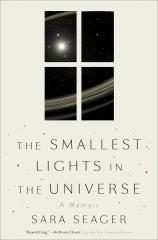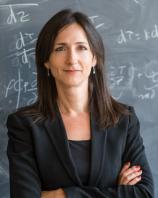The Smallest Lights in the Universe: A Memoir
Review
The Smallest Lights in the Universe: A Memoir
Just a few days after reaching the last page of THE SMALLEST LIGHTS IN THE UNIVERSE and wishing there was more to read, I tuned in to a talk show in progress on CBC Radio (that’s Canada’s public network, similar to NPR).
I heard a woman’s crisp, precise voice say just one word, “exoplanets,” and instinctively knew it was author Sara Seager, even though it was several minutes before the interviewer paused to remind listeners, “If you’ve just tuned in, I’m talking to a Canadian planetary astrophysicist who’s looking for other planets like Earth…” Fortunately, I caught the entire interview when it aired again on a late-evening slot, and, as if that wasn’t enough, I listened to it again online.
Why did the sound of her voice become so important? In THE SMALLEST LIGHTS IN THE UNIVERSE, Seager illuminates the startling discovery she encountered not long before writing her book --- that she was recently diagnosed as being on the autism spectrum. While knowing ever since her childhood in Toronto that she was “different” --- socially awkward and unusually focused on whatever she turned her imagination to --- Seager was never tested for neurological anomalies, even though her father (with whom she had a supportive relationship) was a doctor.
"This is a book that I both felt and heard, as so many of its 'smallest lights' took on substance and wonder."
She describes frankly and honestly how autism impedes the brain’s ability to emotionally inflect speech, a trait usually misinterpreted as rude or distant that she now tries to overcome. In the interview and the book, I heard a gifted scientist’s passion and precision, a loving mother’s admiration for her two sons, a widow’s ongoing grief at the loss of her first husband (who did much of the parenting when she traveled for work), and the life-changing wonder of a 10-year-old who first really saw the stars on a northern Ontario camping trip far away from city lights.
Despite an unsettled and dysfunctional childhood exacerbated by her parents’ separation and her mother’s unwise lifestyle choices, Seager was determined to chart her own course and from her early teens absorbed everything she could find about astronomy. She spent the entire earnings from her first summer job to buy a telescope and was ecstatic the first time she saw Jupiter.
While her classmates at Jarvis Collegiate were out on dates, she was going to the University of Toronto for public astronomy lectures, the Royal Ontario Museum planetarium or the David Dunlap Observatory just north of Toronto --- all places I loved at the same age, except that I really and truly sucked at math and physics, and she, of course, did not.
Seager, a multiple science award-winner who has taught at the famed Massachusetts Institute of Technology (MIT) since 2006 and was named by Time Magazine as “one of the twenty-five most influential people in space,” easily could have written solely about exoplanets. There are potentially billions of them in all shapes and sizes, orbiting billions of stars in billions of galaxies across the universe. Until quite recently, exoplanets held rather precarious respect in the scientific world, going in and out of fashion every few decades. However, Seager decided early in her career to commit to them and has been an unwavering advocate ever since.
As she argues in THE SMALLEST LIGHTS IN THE UNIVERSE, the more and deeper earth-based and orbiting telescopes probe space, the higher the odds that scientists will discover distant planets with characteristics so similar to Earth that they could well be home to sentient beings. And she’s talking near-future. Perhaps within the lifetime of her readers, she or one of her colleagues will have found what “Star Trek” has called “Class M worlds” since its inception in the mid-1960s.
What makes Seager’s book both scientifically fascinating and memorable as a personal story, however, is that her drive and passion for scientific progress is entwined with the challenges of being a parent and the trauma of losing her first husband Mike to cancer while their children were still young and her career was accelerating. With heavy demands on her time and an often punishing travel schedule, Seager relied on her husband for the practical skills of running a household, so much so that during his last days Mike wrote a guidebook telling her who to call for basic home maintenance and other daily tasks. Every woman who has lost her husband too suddenly can affirm how valuable such a document would be, and I can speak from direct experience on that point.
Perhaps Sara Seager’s greatest accomplishment in THE SMALLEST LIGHTS IN THE UNIVERSE is that she doesn’t simply interleave stories of her own beginnings, her family life, her grief and the remarkable women who shared it into her scientific career. Instead, she has created a compelling narrative counterpoint, a kind of prose fugue in which all the facets, the voices, of her life co-create the whole. This is a book that I both felt and heard, as so many of its “smallest lights” took on substance and wonder.
Reviewed by Pauline Finch on September 18, 2020
The Smallest Lights in the Universe: A Memoir
- Publication Date: August 3, 2021
- Genres: Memoir, Nonfiction, Science
- Paperback: 336 pages
- Publisher: Crown
- ISBN-10: 0525576266
- ISBN-13: 9780525576266




